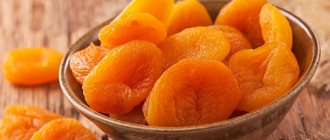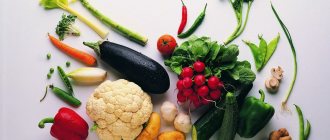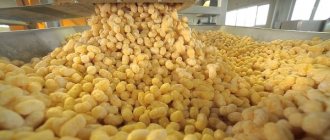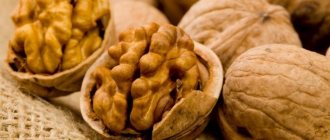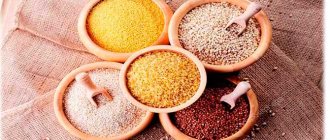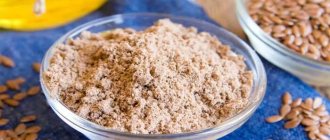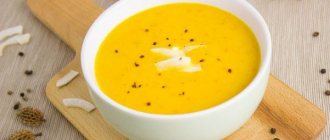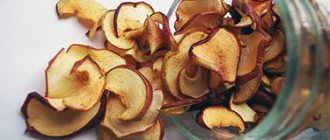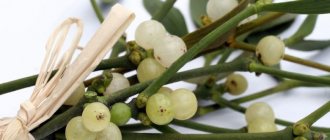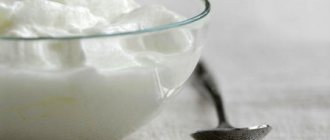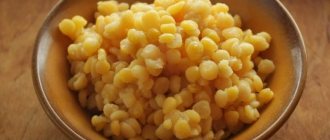Varieties
Dried apricots are obtained by drying apricot halves in the sun or in special electric dryers. Depending on the variety, size of the fruit and drying method, the process of obtaining a tasty and nutritious product takes from 6 to 14 days.
During the production process, dried apricots do not lose their valuable qualities. On the contrary, the amount of minerals in dried fruits is slightly higher compared to fresh fruits. All types of dried apricot fruits have similar characteristics, and their main difference lies only in the method of preparation:
- dried apricots - individual halves of apricot, dried without pits;
- apricot – small-fruited varieties, dried whole without removing the pit;
- kaisa – large whole apricot fruits from which the seeds have been removed before drying.
Apricots are used mainly for making compotes; kaisa has a higher price. But dried apricots pleasantly combine an appetizing appearance, an affordable price and beneficial properties.
general information
What it is
Dried apricots are dried halves of apricots from which the pit has previously been removed. Should be distinguished from other dried fruits obtained from the same fruit:
- apricot - dried whole small-fruited apricot along with the pit;
- kaisa - dried whole apricot without pit (it is removed in advance through a recess made where the stalk is attached);
- Ashtak is a dried whole apricot, from which, before the drying process, the pit is carefully removed, and the kernel is removed from it and then put back into the fruit.
For weight loss, it is better to choose dried apricots, since other dried fruits obtained from apricots no longer have such a wealth of beneficial properties and have a higher calorie content.
Production process
Drying apricots is a production process in several stages:
- Fresh, selected, large apricots are cut into halves.
- A bone is removed from each.
- Next, the fruits are dried in the sun in places specially equipped for this. Duration - 6-8 days.
When the fruits get exposed to moisture during this process, they darken. To get 1 kg of dried apricots, you need about 4 kg of fresh ones. The uniqueness and value of this product is that during the production process it retains most of the vitamins and microelements.
Chemical composition
If we talk about what vitamins and other useful substances dried apricots are rich in, it’s easier to name those that are not in it. This is another undoubted advantage for losing weight: if you include it in your diet, you don’t have to worry about vitamin deficiency. The body will receive everything it needs. Especially the heart, because there is so much magnesium here!
Compound:
- vitamins: A, B1, B2, B4, B5, B6, B9, C, E, H, K, PP, beta-carotene;
- macroelements: potassium, calcium, silicon, magnesium, sodium, sulfur, phosphorus, chlorine;
- trace elements: aluminum, iodine, boron, vanadium, iron, cobalt, lithium, manganese, copper, molybdenum, nickel, rubidium, selenium, fluorine, chromium, zinc;
- omega-6 fatty acids;
- starch and dextrins.
Thanks to such a rich chemical composition, dried apricots turn out to be a very healthy product.
The nutritional value
The calorie content of dried apricots per 100 grams is 241 kcal. Proteins - 3.39 g; fat - 0.51 g; carbohydrates - 62.64 g.
If you know how much one dried apricot weighs, you can calculate the nutritional value individually. Approximately (if you take a medium-sized dried fruit) there are 7 grams in one piece. So the calorie content of dried dried apricots per 1 piece. is about 16.8 kcal. Proteins - 0.24 g; fat - 0.04 g; carbohydrates - 4.47 g.
Using simple calculations, it turns out that 100 grams of dried apricots is approximately 14 pieces.
Origin of name. The word is borrowed from the Turkic language, where “kurägä” is translated as “dried apricots”.
Vitamin and mineral composition and nutritional value
When drying fresh fruits, the mass of the final product decreases by 3-4 times. But all the valuable substances remain inside the dried pulp:
- vitamins: A, B₁, B₂, B₅, C, PP;
- minerals: iron, iodine, potassium, calcium, magnesium, sodium, phosphorus;
- organic acids;
- carotene;
- pectins;
- natural sugars: glucose, sucrose, fructose.
The nutritional value of dried apricots is presented in the table:
| Nutrients | Contents per 100 g of product |
| Squirrels | 3,4-5,2 |
| Fats | 0,3-0,5 |
| Carbohydrates | 51-62 |
| Water | 20-30 |
| Cellulose | 7-11 |
The BJU ratio given in the table varies depending on the method of production of dried fruits and the variety of apricots used for drying.
The calorie content of dried apricots is 215-232 kcal per 100 g of product. This figure is one of the lowest compared to other popular dried fruits. The average weight of one dried half is 5-8 g, so 1 piece contains about 11-18 kcal.
The small amount of calories contained in dried apricots allows you to use it when losing weight: for snacks between main meals, as a dessert for tea or coffee, for fasting days or a short-term mono-diet.
Pros and cons of dried fruit, benefits for the body
Unlike other dried fruits, dried apricots contain a huge amount of potassium. Therefore, it is recommended for cardiovascular diseases. Also in the composition you can find a complex of vitamins, minerals and other components that the human body needs.
Another component of dried apricot is iron, which helps with anemia and replenishes the lack of hemoglobin.
The ratio of proteins, fats and carbohydrates (BJU) in 100 g of dried apricots, calorie content of dried fruit:
Knowing how many calories are in dried apricots per 100 grams is necessary in order to understand when it is best to consume them. 100 g contains approximately 215 kilocalories. Since the product is rich in carbohydrates, it is best used as a snack. Dried fruit can charge the body with energy and quickly suppress the feeling of hunger.
Calorie content of one dried fruit
1 medium-sized dried fruit weighs approximately 5–10 g, so the calorie content will be from 10 to 20 kilocalories for one fruit.
When losing weight
The calorie content of dried dried apricots without seeds is quite high, so when losing weight it is recommended to strictly dose the amount of dried fruit consumed. You shouldn’t completely give up fruits either, since dried fruits have a rich vitamin and mineral complex that provides support for the body’s immunity.
Practical advice: It can be used as an alternative to sweets, tea and sugar desserts. It is recommended to include no more than 5-6 dry fruits daily in the menu of a person losing weight.
Compote of dried apricots
If you cook compote from dried apricots, then its calorie content without added sugar per 100 g will be 25 kilocalories. In order to brew such a drink, you need to prepare 150–200 g of dried apricots and 1 liter of water.
Cooking recipe:
- initially rinse dried fruits in water to clean them from possible dirt and dust that could accumulate on the fruits during storage;
- pour the dried fruits with cold water in a saucepan and place it on the stove;
- Once the liquid boils, reduce heat and simmer for 10 minutes.
When the compote is ready, you can cool it in the refrigerator for 5 hours so that it can brew properly.
Important! If necessary, you can add citric acid or sugar to the drink, and also cook it with the addition of other dried fruits, such as raisins, dried apples, and prunes.
Dried apricots in chocolate
Dried apricots covered in chocolate are a sweet that both adults and children love. 100 g of dried fruits in chocolate contains the following ratio of BJU:
Health benefits of dried apricots
Due to the content of a large amount of vitamins and minerals, dried apricots have a beneficial effect on health:
- regulates blood pressure;
- improves the functioning of the heart muscle;
- increases the level of hemoglobin in the blood and prevents the development of anemia;
- prevents the leaching of potassium from the body, which is inevitable when taking diuretics;
- helps cleanse the liver;
- improves intestinal function, stimulates the exit of feces from the intestines and serves as a means of preventing constipation;
- helps remove waste, toxins, radionuclides, heavy metal salts and other harmful substances;
- lowers the level of “bad” cholesterol in the blood;
- improves the functioning of the visual organs;
- strengthens the immune system;
- is a means of preventing urological diseases in men (prostatitis, impotence).
Dried apricots are beneficial not only for internal organs: the vitamins and minerals contained in dried fruits help strengthen hair and rejuvenate the skin.
To treat various pathologies, it is enough to eat only a few halves of dried apricots a day. Recommended doses are presented in the table:
| Disease | Recommendations |
| Treatment of blood vessels and heart | Consume 40-50 g per day |
| Elimination of swelling of various etiologies | Eat 100-120 g of product daily, dividing the total amount into 2 doses |
| Normalization of the thyroid gland | It is enough to eat 5-7 pieces of dried apricots per day |
| Chronic and spastic constipation | Use 50 g of dried apricots: steam in 100 ml of boiling water, leave for 20 minutes, eat the soaked dried fruits and drink the infusion |
| Stunted growth (in children) | Give your child 10-12 pieces of dried apricots |
| Increased body temperature with a cold or flu | Pour 100 g of dried fruits into 200 g of water, bring to a boil, cool and drink. Wrap yourself in a warm blanket and sweat |
Nutritionists advise eating dried apricots in the first half of the day: after the main meal for dessert, as an additive to porridge or as a light snack when you feel hungry.
Benefits for weight loss
As mentioned above, dried apricots have a high calorie content, so when losing weight they should be consumed carefully. But you shouldn’t completely exclude it either, otherwise you can get the opposite result.
Video
But still the benefits for weight loss are quite large:
- Dried fruit can act as a substitute for sweets. It helps to give up pastries, sweets, cakes, and desserts.
- It has a beneficial effect on the state of the intestinal microflora; when consuming apricot, constipation goes away and the heaviness of the abdomen disappears. Speeds up metabolism, this is what is considered the most important component in losing weight.
- Has a strong diuretic effect. Due to this, all harmful substances and toxins leave the body naturally.
- The composition contains an increased level of carbohydrates. Thanks to this, dried fruit charges you with energy and strength, and increases brain activity.
Eating dried apricots when losing weight will help avoid mood swings, which often occur during severe hunger. But still, you shouldn’t get too carried away with dried fruit, because it has high nutritional value. If you plan your diet correctly, then 2-3 pieces of dried apricot will definitely not cause harm; on the contrary, they will be able to satisfy the feeling of hunger, fill you with nutrients and improve your health.
Dried fruits for pregnant women
During pregnancy, a woman's body lacks many vital substances. Dried apricots help replenish the deficiency of vitamins and minerals, and also improve the well-being of the expectant mother:
- helps replenish iron reserves in the body and prevents the occurrence of iron deficiency anemia, which can develop during pregnancy;
- has a beneficial effect on the cardiovascular system of the mother and fetus;
- has a mild laxative effect and prevents the development of constipation;
- saturates the body with iodine and normalizes the functioning of the thyroid gland;
- slightly reduces high blood pressure;
- supplies the brain with essential glucose and fructose.
Dried apricots can replace sweets and, when consumed in moderation, do not allow a woman to gain excess weight.
Nutritional value
Apricots are generously endowed by nature with vitamins and microelements. And, although the energy value of aromatic dried apricots is much higher than that of a fresh product, due to its rich composition it helps maintain health during the cold season. Dried fruits contain:
- carotene;
- vitamins A, B;
- iodine;
- iron;
- potassium.
Beloved by many women, dried apricots, whose calorie content per 100 g is due to the high carbohydrate content of dried fruits (25 g), can well be used for weight loss. It consists of 70% water and covers a fifth of a person’s daily need for dietary fiber. And in combination with pectin, valuable amino acids and microelements, dried apricots will help not only lose weight, but also improve your health.
Dried apricots for children
Dried apricots can be given to a child only from the second year of life and provided that the baby is not prone to allergies. Children with individual intolerance to various foods are allowed to introduce dried fruits into their diet only after reaching 3 years of age.
The first time, the dried apricots need to be ground to a puree and given no more than half a teaspoon. If unpleasant allergy symptoms do not appear, the amount of dried fruits can be gradually increased and increased to 50 g per day.
For children aged 1-2 years, it is recommended to add dried apricots to porridge or curd desserts. Starting from 3 years old, it is useful to give dried fruit compote to children. The calorie content of this drink depends on the amount of sugar used in preparation. In the classic recipe, prepared from 2 liters of water, 250 g of dried apricots and 100 g of granulated sugar, the calorie content usually does not exceed 40 kcal per 100 g.
Dried apricots calorie content
Dried apricots are the same dried apricots that can be easily found in any store or supermarket. When heat treated, ripe and juicy fruit loses color and becomes less bright. You need to select the currently popular dried fruit with particular seriousness, paying attention to its color and appearance. If the shade remains bright, then chemicals were used to create it. Also, when buying dried fruit, you need to know the nutritional value and calorie content of dried apricots per 100 grams in order to correctly and in the right quantity include it in the diet.
Vitamin mixture with dried apricots
For medicinal and preventive purposes, it is recommended to combine dried apricots with other healthy products: walnuts, prunes, raisins. To prepare the vitamin mixture, you need to take 200 g of the listed ingredients, add 3-6 tbsp. l. natural honey and 1 lemon.
Composition of vitamin mixture with dried apricots
The process of preparing this dish is simple:
- Cut the lemon into small pieces, remove all the seeds at the same time.
- Heat the walnut kernels in the oven or in a dry frying pan.
- Remove pits from prunes.
- Pour boiling water over dried fruits, drain the water after 10 minutes and dry the products with a towel or cloth.
- Mix all ingredients in a blender or pass through a meat grinder.
- Add honey and mix thoroughly.
- Transfer the finished mixture into a dry sterile jar, close the lid and store in the refrigerator.
The calorie content of such a vitamin supplement is 350 kcal per 100 g. Adults are recommended to eat 1 tbsp daily. l. mixtures, children - 1 tsp. The daily norm should not exceed 5-6 tbsp. l. (approximately 125-150 g) of the finished product.
Chemical composition of dried apricots
There are three types of dried apricot: dried apricots, apricots and kaishi. A distinctive feature of dried apricots is that the fruits are dried without seeds. The chemical composition of the product also depends on this. During the drying process, some trace elements, vitamins and minerals change their levels. Therefore, dried apricots cannot be equated with apricots.
In terms of nutritional value, dried apricots surpass even fresh fruits. Also, the vitamin composition deserves attention. Dried apricots are famous for their B vitamins. The record holder is vitamin B4. Next come vitamin B3, B2, B5, B6, B1, B9. In addition to this vitamin group, dried apricots contain a lot of beta-carotene, vitamins A, C, E, K. The amount of vitamin A is staggering - 3/4 of the daily value of this component.
The mineral composition is also rich. Thus, dried apricot is famous for its record potassium content. Among other microelements it is worth highlighting the following:
- Phosphorus;
- Magnesium;
- Zinc;
- Sodium;
- Iron;
- Copper;
- Calcium;
- Selenium;
- Manganese.
Possible harm
It is not recommended to use dried apricots for diseases of the gastrointestinal tract - stomach or duodenal ulcers. The product can be harmful to patients with diabetes, because dried apricots contain a large amount of glucose. Such patients should consult a doctor and consume dried apricots in doses, not exceeding the permitted daily intake.
Individual intolerance is also a contraindication to eating dried apricots. The product itself rarely causes allergies, but sulfur oxide and other preservatives used to process dried fruits can accumulate in the body and provoke the development of serious pathologies. However, the occurrence of severe allergic reactions is likely only with prolonged consumption of dried apricots, kaisa, apricots and other types of dried fruits.
The bright orange color of dried apricots is a sign of treatment with sulfur dioxide
Fiber stimulates intestinal motility, so excessive consumption of dried apricots can cause digestive upset. It is this property of dried fruit that is used in the treatment of constipation. If you do not exceed the daily norm of 100-150 g, determined for a healthy adult, then you don’t have to worry about diarrhea and bloating.
Benefits, harms, calorie content of dried apricots per 100 grams, 1 piece
Dried apricots are the first dried fruit in terms of potassium content. Therefore, it is recommended for diseases of the heart and blood vessels. In addition, the composition includes vitamins, minerals and nutrients that the body needs for comfortable functioning.
The dried fruit also contains iron, which helps to avoid anemia (lack of hemoglobin in the blood).
Dried apricots BZHU – per 100 grams of product contains:
- proteins – 5 grams (7% of the daily value);
- fats – 1 gram (1% of the daily value);
- carbohydrates – 52 grams (18% of daily value)
100 grams contain about 215 kcal.
Dried fruit contains enough carbohydrates, so it is used as a snack to replenish energy and satisfy hunger.
In 1 piece
1 dried fruit weighs about 5-10 grams, depending on the size of the fruit. The calorie content of 1 berry is 10-15 Kcal.
When losing weight
It is a high-calorie product, so it is recommended to limit its consumption when losing weight. It is not recommended to completely exclude dried fruit from the diet, as it contains vitamins and minerals necessary to maintain the immune system and microflora of the body.
Dried apricots provide a hint of sweetness. Great as a dessert for tea (substitute for sweets, cakes, sugar).
When losing weight, eat no more than 5-6 berries per day.
Compote of dried apricots
The energy value of dried fruit compote without sugar is 25 Kcal per 100 g. To prepare 1 liter of compote you will need:
- 150-200 grams of dried apricots;
- liter of water;
When preparing compote, follow the following instructions:
- Before cooking, rinse the berries under running water (when stored in warehouses and stores, they may become dirty and covered with dust);
- pour washed dried fruits with cold water;
- put the pan on the fire;
- after the mixture boils, leave on low heat for 10 minutes;
After finishing cooking, let the compote cool and put it in the refrigerator for 5-7 hours (so that the compote infuses).
If desired, you can add sugar or citric acid to the compote.
Dried apricots in chocolate
Dried fruit in chocolate is a favorite treat for children and adults. Dried dried apricots bju in chocolate per 100 grams:
- proteins – 3.5 grams (5% of the daily value);
- fats – 13 grams (17% of the daily value);
- carbohydrates – 54 grams (19% DV)
Recommended for consumption by people who find it difficult to give up sweets. It is an excellent substitute for regular chocolate.
100 grams contains 360 calories, which is 18% of the daily value. People who are losing weight are advised to avoid eating dried apricots in chocolate.
Benefit
Benefits of eating dried apricot:
- has a diuretic effect (indicated for diseases of the urinary system);
- cleanses and protects the body from harmful substances;
- due to the iodine content, it is used to treat thyroid diseases;
- Prescribe use for high blood pressure;
- has a positive effect on the condition of the visual organs (stabilizes and improves visual acuity);
- strengthens blood vessels, improves blood circulation;
The benefits are doubled if consumed together with prunes. The BJU of dried apricots and prunes are approximately at the same level.
It can cause harm to the body only if used in case of contraindications. It is not recommended to consume dried apricots in the following cases:
- thyroid diseases;
- diseases associated with the gastrointestinal tract (ulcers, gastritis);
- increased sensitivity to dried fruit (when the first symptoms of allergy appear: rash, redness, itching - immediately stop taking the fruit and contact an allergist for advice);
In other cases, it is recommended for daily use.
Dried fruits for weight loss
Despite the fact that dried apricots contain a lot of complex carbohydrates, their benefits for weight loss are undeniable. Dried halves of apricots quickly dull the feeling of hunger if they are gradually dissolved in the mouth. By consuming dried fruits with tea or coffee, you can easily give up sweets and other sweets that are harmful to your figure: such a replacement will allow you to lose 1-2 kg in just a month.
Nutritionists recommend having a fasting day on dried apricots once a week. The daily diet should contain:
- 2 cups dried fruits;
- filtered or still mineral water;
- green or herbal tea without sugar.
The liquid can be drunk in unlimited quantities, but the dried apricots must be washed the day before and soaked overnight in water. In the morning, the apricot infusion should be drunk on an empty stomach, and the entire volume of dried fruit should be divided into 5-6 equal portions and eaten at regular intervals throughout the day.
Fasting days spent in this mode promote gentle weight loss. But it’s better to spend them on your day off, when you don’t have to go to work or school, since eating an increased amount of dried fruit can have a laxative effect or provoke flatulence.
How many calories are in dried apricots (1 piece)?
The “ancestor” of dried apricots is apricot fruit. They are dried, as a result of which the moisture is eliminated and only the raw materials remain. After drying, the amount of sugar contained in apricots increases. That is why dried fruits have high nutritional value. How many calories are in dried apricots without pits? A 100-gram serving of this delicacy contains approximately 214 kilocalories. Moreover, the majority, almost 51 grams, are carbohydrates. Dried apricots contain ten times less protein of plant origin, and virtually no fat.
To determine the calorie content of one dried apricot, you need to know its mass. As practice shows, the weight of one dried apricot can vary from 5 to 8 grams. Accordingly, the nutritional value ranges from 10-17 kilocalories.
As you can see, such a delicacy cannot be called low-calorie. But if you limit the consumption of dried apricots per day, then you can eat them at least every day.
Healthy compotes are often prepared from dried apricots. The nutritional value of the drink will be only 40 kilocalories per 100 ml.
Dried apricots in chocolate glaze are often found on sale. The nutritional value of this sweet is even higher. A 100-gram serving contains up to 400 kilocalories. As you understand, such a delicacy is strictly contraindicated for people suffering from excess weight.
Contraindications for use and possible harm
This product should be consumed with caution and in small quantities by those who suffer from hypotension, that is, low blood pressure. Since it can slightly lower blood pressure, it will most likely do more harm than good to such people. People who suffer from digestive problems or have a weak stomach should be careful when choosing and consuming this dried fruit. This is explained by the laxative properties of this product.
Of course, you shouldn’t give up using it completely, but nevertheless, in large quantities it can cause more harm than good. Although diabetics are allowed to eat dried apricots, they should not consume them in large quantities. A duodenal or stomach ulcer should be a reason to stop eating dried apricots.
Poor quality dried apricots can also cause harm. Sometimes, in order to preserve the unnatural orange color, which is characteristic only of fresh apricots and not dried ones, producers resort to the use of artificial, although “identical to natural”, dyes. A product with an unnatural odor can also be dangerous. It doesn't have to be the smell of rotten apricots, it can just be a distinct natural smell. The fact is that esters evaporate during drying. This means that when dried under natural conditions, it should have a slight odor.
How to choose the right dried apricots?
Only a high-quality product will provide benefits to the human body and health. Therefore, you need to know some features of choosing dried fruit. If the dried apricot fruits are perfectly smooth, even in color, and transparent, most likely the fruit has been treated with sulfur dioxide. Such ideal fruits are not worth buying. Natural dried apricots are dark in color. And light fruits are treated with bleaching agents.
Good, high-quality dried apricots do not stick together and do not smudge when you press on them. The smell of a good product is reminiscent of the aroma of dried apricot. It is better to buy dried apricots from o. This ensures that there are minimal chemicals and preservatives. There are a lot of different dried fruit mixes on supermarket shelves that are not recommended to be purchased. This is because different fruits require different means for processing and drying. It is better to give preference to products imported from Central Asia, China or Turkey. Thus, matte fruits, dark in color, with the aroma of apricot will be beneficial.
What are the benefits of dried apricots for weight loss?
Of course, in order to use dried apricots for weight loss, you will need to introduce this product into your daily diet, but just do not overuse it. You can add dried apricots to your dietary vegetable or fruit salad; dried apricots also go well with oatmeal, boiled or baked meat.
This product will save you when you want something sweet, or when you are simply hungry. You can take a couple of dried apricots, eat them and drink one glass of water, preferably boiled, this will perfectly satisfy your hunger, and for a long time. That is, until the next lunch you can work calmly and not feel hungry.
If you just want to do fasting days, then dried apricots will help you perfectly with this. To do this, you need to take several glasses of dried apricots, wash them thoroughly, add boiled water, and leave them to steep overnight. Before breakfast, you need to drink the water in which the dried apricots were infused, and eat the fruits of the dried apricots throughout the day, but not in large quantities, that is, you need to eat all the dried apricots in six or seven meals.
On the same day you should drink a large amount of liquid, about three liters. It doesn't have to be plain water, you can drink herbal tea, or green tea with lemon, but just don't use sugar, and never drink sparkling water.
Diet based on dried apricots:
Dried apricots go well with various dried fruits. In three to five days, weight loss will be about 3-4 kilograms.
In equal proportions, prepare a mixture of dried apricots, apples, prunes, almonds and hazelnuts (everything except dried apricots can be taken at your discretion). It should be at least 500 grams - this is the norm for a day. Divide this volume into the number of meals, chew each serving thoroughly, wash down with green tea or clean water.
The result will be a fresh face, restoration of the structure of nails, hair, and, of course, lost pounds.
prokalorijnost.ru
Dried halves of pitted apricots dried in the sun are called dried apricots; this is one of the brightest representatives of dried fruits. Large fruits are dried in the sun; the process takes from 6 to 8 days. The finished natural product may lose a little color due to natural fading, so the too rich orange color of dried apricots indicates that chemical additives were used to improve the appearance and increase the shelf life of the product (calorizator). The main suppliers of dried apricots to the world market are traditionally the countries of the Central Asian region, Northern China, the state of California and the Caucasian republics of Russia.
There are other types of dried apricots, the well-known apricot
– small apricots, dried with pits and
kaisa
– large whole apricots from which the pits have been removed before drying. Dried apricots vary in grades - table, first, highest and extra. The higher the grade, the better quality the apricots are dried.
Calorie content of dried apricots
The calorie content of dried apricots is 215 kcal per 100 grams of product.
Composition and beneficial properties of dried apricots
Dried apricots rank first among foods in terms of potassium content; they are recommended to be used as a preventive measure for cardiovascular diseases and after heart attacks and strokes. The product also contains: vitamins A, B1, B2, C, PP, as well as minerals necessary for the human body: potassium, calcium, magnesium, iron, phosphorus and sodium. Due to the presence of fiber, dried apricots tend to stabilize the gastrointestinal tract and fight constipation, including chronic ones. Dried apricots effectively remove toxins and waste from the body and help cleanse the liver. A mixture of dried apricots, prunes, walnuts and honey is an excellent vitamin supplement for maintaining immunity.
Harm of dried apricots
The main contraindications to eating dried apricots are stomach and duodenal ulcers, diabetes and thyroid diseases.
Dried apricots in weight loss
Dried apricots are one of the main ingredients of the apricot mono-diet, a fasting day; a few pieces, soaked in the evening and eaten in the morning, guarantee regular cleansing of the intestines, which promotes gentle weight loss.
How to choose dried apricots
When choosing dried apricots on the market, you need to be guided by common sense, and not by the impression of the unreal beauty of the product. The bright orange color and glossy shine of dried apricots indicate that they were not produced in a natural environment, but using chemical reagents. Dried apricots, dried under normal conditions, have a slightly grayish color; they are not wet or sticky. It is best to store dried apricots in a glass jar, away from direct sunlight.
www.calorizator.ru
How to choose dried apricots?
Apricots dried in the sun naturally have their natural orange color, but with a slight gray tint. In addition, the fruits have a slight apricot smell.
It must be of good quality, soft, moderately elastic and have approximately the same color for all fruits. It should not be sticky or wet between each other. An unnaturally bright orange color or a strong smell, including a characteristic one, indicate the use of a large number of dyes and flavors. Since dried apricots are a product that does not require the use of any additional ingredients for its preparation, for example, preservatives or dyes, it is better to avoid purchasing such dried apricots.
Dried apricots in cooking
This dried fruit has very wide uses in cooking. Adults and children enjoy it as snacks between meals; many add it to oatmeal for breakfast. In addition, supporters of a healthy diet love to use dried apricots in dishes and especially salads. You can cook meat with dried apricots, stewed or baked. It can also be added to many salads, especially fruity and sweet ones. Since it is a very sweet representative of dried fruits, it has been used in various desserts. So, it is used for preparing and decorating pastries, cakes, making soufflés, and so on.
You can learn more about the benefits and harms of dried fruits in the following video:
So, this dried fruit is a food item that can provide many benefits. However, there are those for whom its use can be harmful. In order not to suffer from consuming this tasty product and to bring maximum benefits to the body, you must always remember that everything is good in moderation!
Contraindications for a diet of dried fruits
Despite all the usefulness and low calorie content of dried apricots and prunes, they cannot be recommended for everyone. We are talking, first of all, about diseases of the digestive system. Still, dried fruits are sweet only subjectively. Chemical analysis suggests that dried apricots and even raisins contain many different acids. There are especially many of them in prunes.
For this reason, a fasting diet of dried fruits is strictly contraindicated for people suffering from gastritis (with high acidity). You should not eat these foods if you have a stomach or duodenal ulcer. They are completely unacceptable for diseases of the pancreas.
Thus, if you are seeing a gastroenterologist or consulting a nutritionist, be sure to ask about the admissibility of a diet of dried fruits. All these fasting and dieting on fasting days will not help a sick person, but rather harm.
Such diets are useful for those who have good health. With the help of dried fruits, you will significantly improve this health, mainly by reducing excess weight.
